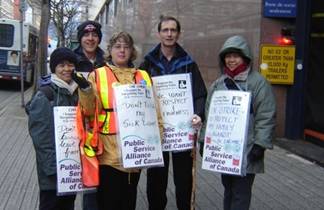UPCE/PSAC and Canada Post: David and Goliath?
 From the start, the labour dispute between Canada Post and its smallest bargaining unit, the Union of Postal Communications Employees (UPCE), has taken on the proportions of the biblical tale of David and Goliath. A component of the Public Service Alliance of Canada (PSAC), the UPCE is a
From the start, the labour dispute between Canada Post and its smallest bargaining unit, the Union of Postal Communications Employees (UPCE), has taken on the proportions of the biblical tale of David and Goliath. A component of the Public Service Alliance of Canada (PSAC), the UPCE is a  predominantly female workforce consisting of approximately 2,400 members. Despite being Canada Post’s smallest bargaining unit, the
predominantly female workforce consisting of approximately 2,400 members. Despite being Canada Post’s smallest bargaining unit, the  UPCE stood its ground after Canada Post attempted to impose a package of contract demands that would strip the current paid family leave entitlement from five (5) days to two (2) days per year and reduce the current sick leave entitlement from fifteen (15) to five (5) days per year. Canada Post also demanded that the UPCE accept a Short Term Disability (STD) plan that would eliminate current sick leave language, subject the administration and approval of sick leave benefits to Manulife Financial (without the right to grieve) and ultimately have the effect of transferring sick leave costs to an already overburdened EI system. Canada Post has referred to its STD proposal as a best practice.
UPCE stood its ground after Canada Post attempted to impose a package of contract demands that would strip the current paid family leave entitlement from five (5) days to two (2) days per year and reduce the current sick leave entitlement from fifteen (15) to five (5) days per year. Canada Post also demanded that the UPCE accept a Short Term Disability (STD) plan that would eliminate current sick leave language, subject the administration and approval of sick leave benefits to Manulife Financial (without the right to grieve) and ultimately have the effect of transferring sick leave costs to an already overburdened EI system. Canada Post has referred to its STD proposal as a best practice.
 By insisting on such a demand, Canada Post virtually ensured a strike. To no one’s surprise, the UPCE voted 88% in favour of strike action, which became effective as of November 17, 2008. Although Canada Post spokesperson John Caines publicly stated that a UPCE strike would have no effect on its delivery operations, the level of support for the UPCE picket lines countrywide has shown the opposite to be true. According to an affidavit obtained by CUPW, the overtime costs resulting from the November 17th picket line activities at the Vancouver Mail Processing Plant (VMPP) tallied $24,000.00. More significantly, Canada Post reported that 135,000 Vancouver residents and businesses did not receive mail delivery on that date.
By insisting on such a demand, Canada Post virtually ensured a strike. To no one’s surprise, the UPCE voted 88% in favour of strike action, which became effective as of November 17, 2008. Although Canada Post spokesperson John Caines publicly stated that a UPCE strike would have no effect on its delivery operations, the level of support for the UPCE picket lines countrywide has shown the opposite to be true. According to an affidavit obtained by CUPW, the overtime costs resulting from the November 17th picket line activities at the Vancouver Mail Processing Plant (VMPP) tallied $24,000.00. More significantly, Canada Post reported that 135,000 Vancouver residents and businesses did not receive mail delivery on that date.
Clearly, Canada Post did not anticipate such resistance. But rather than return to the bargaining table, Canada Post applied for and obtained an injunction limiting picketing activities at the Vancouver Parcel Distribution Center (VPDC), the VMPP, and a Cambie Street parking lot. The injunction is proof of the resolve of the UPCE picket line, but Canada Post’s refusal to return to the bargaining table remains disturbing. After a decade of profits (during which time 547 million dollars was paid to the federal government in the form of dividends) there is no question that Canada Post has evolved into a self-sustaining Crown Corporation. Why then the necessity of stripping the sick leave benefits of Canada Post’s smallest bargaining unit? Why would CPC seek to transfer the cost of those benefits to the EI system?
The answers may well rest with the Canada Post Strategic Review. Initiated by Prime Minister Stephen Harper prior to the federal election, the Strategic  Review Committee was appointed to review Canada Post’s current mandate. One of the issues being reviewed includes the deregulation of Canada Post’s exclusive privilege to deliver first-class mail. If the Review Committee were to recommend any form of deregulation, Canada Post’s current delivery operations, particularly in the urban areas, could potentially be opened for tender. Is Canada Post CEO Moya Greene, a proponent of liberalization, attempting to prepare Canada Post for deregulation by using the UPCE as a model for transferring its costs to the EI system? Or is Moya Greene simply attempting to guarantee her 33% performance bonus?
Review Committee was appointed to review Canada Post’s current mandate. One of the issues being reviewed includes the deregulation of Canada Post’s exclusive privilege to deliver first-class mail. If the Review Committee were to recommend any form of deregulation, Canada Post’s current delivery operations, particularly in the urban areas, could potentially be opened for tender. Is Canada Post CEO Moya Greene, a proponent of liberalization, attempting to prepare Canada Post for deregulation by using the UPCE as a model for transferring its costs to the EI system? Or is Moya Greene simply attempting to guarantee her 33% performance bonus?
For more information on the STD scheme, please visit www.psac.com
Ken Mooney
Grievance Officer

